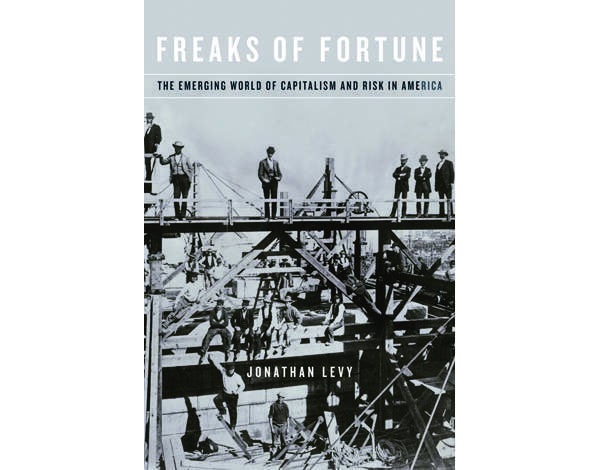

Freaks of Fortune, The Emerging World of Capitalism and Risk in America
Jonathan Levy
Harvard University Press
EX LIBRIS
Christopher Silvester on the pioneers of risk management in the US
‘Freaks of fortune’ was the popular 19th-century locution for those ups and downs of economic destiny that elevated or destroyed individuals’ fortunes. At the outset of the 19th century, America was a rural society and the task of risk management, of containing the economic effects of weather events and crop failures attributed to providence, was performed by extended families and the small communities in which most people lived.
Gradually, the concept of risk that had been familiar to marine insurers was imported on to dry land. As industrial capitalism extended its reach throughout American society, the notion of providence waned and people chose instead to rely on financial instruments to offload the risk in their lives.
For Jonathan Levy, an assistant professor of history at Princeton University, ‘analysing the nitty-gritty details of new financial practices demonstrates how risk burrowed into popular consciousness’, while ‘following risk across many registers of thought, action, and experience captures much of the human drama of capitalisttransformation’.
Thus, this history or biography of risk — he uses both terms — touches on aspects of philosophical and cultural as well as financial and social history. For example, slavery was ‘to have someone else own the risk on your life’. Freedom meant self-ownership. Accident insurance for workmen was born out of the railway boom of the 1840s and in an 1842 judgement it was decided that the loss of an engine-man’s right hand was his own responsibility, not that of his employer, because he had owned (or ‘enclosed’) an upside risk within his autonomous self when he bargained for higher wages because of the perceived dangers of his work.
The American abolitionist Elizur Wright, who became the father of actuarial science, developed the notion of life insurance as ‘a financial invention, by which capital in the shape of a productive life… can perpetuate itself, or convert a part of its productive energy into a contingent fund, that will be immediately available in the case of death’. It was, explains Levy, ‘a contract of purchase and sale, with a distinct form of alienable private property — a “risk” — as the object of exchange’.
The reason it was called life, not death insurance, was that it insured ‘the future value of the exertions of an individual’. Actuarial science began to topple providence from its perch in the minds of men.
Following the emancipation of the slaves, four million of them ‘entered the brave new world of capitalism and risk’. Theirs was a rude awakening. The Freedman’s Bank, in which many of them deposited their savings, was wiped out by the financial panic of 1873. In a fascinating foretaste of rather more recent events, Levy shows how mortgage-backed securities became commonplace in the 1870s.
New intermediaries acquired mortgages on farms in the West and sold them on to investors in the East — that is, until the market collapsed in 1893. Commodity futures and derivatives contracts arose in the decade following the Civil War, producing a new professional category of futures traders. By 1870 there were twenty organised trading pits across the US, while there were many lesser bodies, known as bucket-shops, throughout rural America. The debate about the ethics of bucket-shop trading embraced academic philosophers as well as jurists.
Because policy-holders often defaulted, the insurance companies built up enormous surpluses which served as one of the major sources of investment capital that drove the burgeoning US economy. (Equitable Life had a surplus of $80 million in 1905.)
George W Perkins was an insurance entrepreneur who advocated consolidation of commercial life into monopolistic corporations. He saw the industrial corporation, says Levy, as ‘an institutional insurance mechanism against the economic chance-world’. He was also a partner in J P Morgan’s investment bank by dint of his vast accumulation of capital through his New York Life Insurance Company, and thus he became the key person behind the formation of two mega-corporations, or ‘trusts’, that sought to collectivise risk on behalf of their employees: US Steel and International Harvester.
Later, Perkins advocated government provision of welfare as a preferable instrument for collectivising risk, and Levy argues that ‘the New Deal constituted the nation as a risk community’.
Levy’s book takes us down some unexpected byways, and despite the occasional lapse into indigestible academic terminology he has pulled off the seemingly impossible task, among other things, of making the early history of the insurance industry scintillate.
Free Americans embraced risk but sought new ways to securitise it. These new financial instruments generated vast reserves of wealth and whole new categories of financial risk, which in turn led to the practice of financial risk management. Before it occurred anywhere else in the world, this was a distinctly American experiment. Of course, we are still living with the freaks.
Read more book reviews from Spear’s






